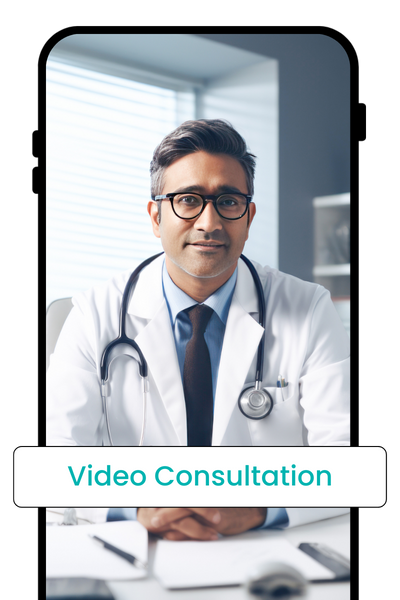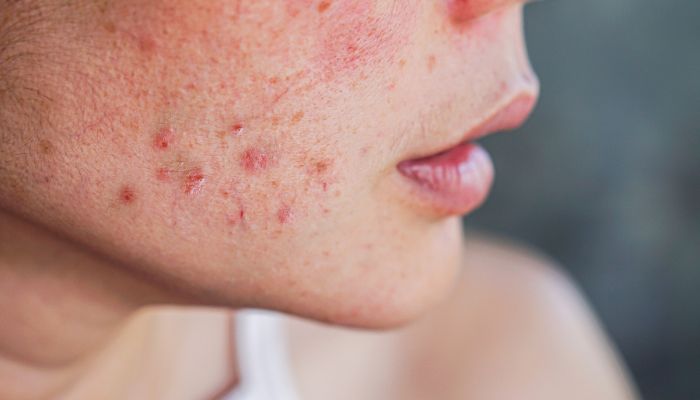Worry about your concern!!
Online consultation · Starts at just ₹199
Consult with top specialist doctors in their fields


Understanding and Managing Acne: Causes, Types, and Treatments
Acne is a prevalent skin condition that most people experience at some stage in their lives. It is characterized by the appearance of spots, oily skin, and sometimes skin that feels warm or painful to touch.
Symptoms of Acne
Acne commonly appears on:
- Face: This area is affected in nearly everyone with acne.
- Back: More than half of people with acne experience it on their back.
- Chest: About 15% of those with acne have it on their chest.
Types of Acne Spots
There are six main types of spots caused by acne:
- Blackheads: Small black or yellowish bumps on the skin. They are not filled with dirt but appear black due to the pigmentation of the hair follicle lining.
- Whiteheads: Similar to blackheads but firmer and do not empty when squeezed.
- Papules: Tiny red pimples that might hurt or feel sensitive.
- Pustules: Similar to papules but have a white tip in the center due to pus buildup.
- Nodules: Painful, large, hard lumps beneath the skin's surface.
- Cysts: The most severe type, these are large, pus-filled lumps resembling boils and have the highest risk of causing permanent scars.
Self-Care Tips for Acne
These self-help techniques may be beneficial:
- Limit Washing: Do not wash affected areas more than twice a day to avoid irritation.
- Gentle Cleansing: Use mild soap or cleanser with lukewarm water. Avoid very hot or cold water.
- No Squeezing: Avoid trying to "clean out" blackheads or squeezing spots to prevent worsening and scarring.
- Choose Non-Comedogenic Products: Use water-based, non-comedogenic skincare and suncare products to avoid blocking pores.
- Remove Makeup: Makeup should always be taken off before sleeping.
- Moisturize if Needed: Use a fragrance-free water-based moisturizer if you have dry skin.
- Exercise Regularly: Exercise helps enhance mood and self-esteem, but it doesn't immediately treat acne. To get rid of perspiration, take a shower shortly after working out.
- Hair Care: Wash your hair regularly and avoid letting it fall across your face.
Treatment Options
While acne cannot be cured, it can be managed with appropriate treatment. For mild acne, consulting a pharmacist for over-the-counter creams, lotions, and gels may be helpful. Products containing a low concentration of benzoyl peroxide can be effective but may bleach clothing. Severe acne, or acne on the chest and back, may require antibiotics or stronger prescription creams.
When to Seek Medical Advice
Consult a healthcare provider if:
- Over-the-counter treatments do not control your acne.
- Your acne is causing significant distress.
- You have moderate to severe acne or develop nodules or cysts to prevent scarring.
Avoid picking or squeezing spots to prevent permanent scarring. Acne treatments may take several months to show results, but they are often effective once they start working.
Causes of Acne
Although it can happen at any age, acne is most frequently linked to hormonal changes that occur throughout puberty. Hormonal changes cause the skin to produce more oil, which clogs pores. This oil, or sebum, encourages the growth of germs, which results in pus and inflammation. Hormones can contribute to clogged pores by thickening the lining of hair follicles. Acne is not caused by sexual activity or poor personal cleanliness.
Other Contributing Factors
- Genetics: If your parents had acne, you are more likely to develop it.
- Hormonal Changes: Menstrual cycles, pregnancy, and other hormonal shifts can trigger acne in women.
Who is Affected?
About 95% of persons between the ages of 11 and 30 have some kind of acne, making it a fairly prevalent condition among teens and young adults. It is more common in guys aged 16–19 and girls aged 14–17. Acne usually goes away by the middle of one's 20s, and most individuals see improvements as they age. It can, however, persist into adulthood, impacting around 3% of persons over 35.
You may better control acne and lessen its negative effects on your life by being aware of its causes and remedies. Effective acne control requires regular attention and the right medications.


